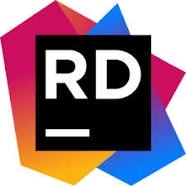From Beginner to Pro: The Ultimate List of 50 IDEs for Every Programmer
CLion
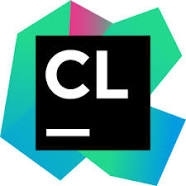
A powerful IDE from JetBrains helps you develop in C and C++ on Linux, macOS and Windows.
Read More About CLion / Source
Geany
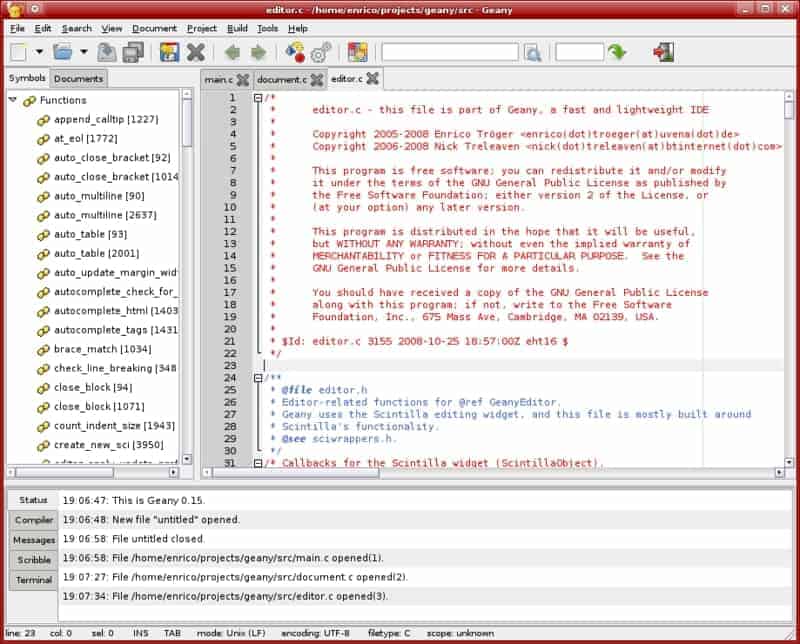
Geany (IPA:dʒiːni) is a lightweight GUI text editor using Scintilla and GTK, including basic IDE features. It is designed to have short load times, with limited dependency on separate packages or external libraries on Linux. It has been ported to a wide range of operating systems, such as BSD, Linux, macOS, Solaris and Windows. The Windows port lacks an embedded terminal window; also missing from the Windows version are the external development tools present under Unix, unless installed separately by the user. Among the supported programming languages and markup languages are C, C++, C#, Java, JavaScript, PHP, HTML, LaTeX, CSS, Python, Perl, Ruby, Pascal, Haskell, Erlang, Vala and many others.In contrast to traditional Unix-based editors like Emacs or Vim, Geany more closely resembles programming editors common on Microsoft Windows such as Notepad++, which also uses Scintilla.It is free software licensed under the terms of the GNU GPL version 2 or later. In 2012, the version number was increased to 1.22 from 0.21 to reflect the maturity of the product, as requested by many users.
Version 1.29 is based by GTK+ 3.22.
Version 1.36 is based by GTK+ 3.24.14.
Version 1.37.1 is last Version with GTK+ 2.24 support.
Read More About Geany / Source
Eclipse

Eclipse is an integrated development environment (IDE) used in computer programming. It contains a base workspace and an extensible plug-in system for customizing the environment. It is the second-most-popular IDE for Java development, and, until 2016, was the most popular. Eclipse is written mostly in Java and its primary use is for developing Java applications, but it may also be used to develop applications in other programming languages via plug-ins, including Ada, ABAP, C, C++, C#, Clojure, COBOL, D, Erlang, Fortran, Groovy, Haskell, JavaScript, Julia, Lasso, Lua, NATURAL, Perl, PHP, Prolog, Python, R, Ruby (including Ruby on Rails framework), Rust, Scala, and Scheme. It can also be used to develop documents with LaTeX (via a TeXlipse plug-in) and packages for the software Mathematica. Development environments include the Eclipse Java development tools (JDT) for Java and Scala, Eclipse CDT for C/C++, and Eclipse PDT for PHP, among others.
The initial codebase originated from IBM VisualAge. The Eclipse software development kit (SDK), which includes the Java development tools, is meant for Java developers. Users can extend its abilities by installing plug-ins written for the Eclipse Platform, such as development toolkits for other programming languages, and can write and contribute their own plug-in modules. Since the introduction of the OSGi implementation (Equinox) in version 3 of Eclipse, plug-ins can be plugged-stopped dynamically and are termed (OSGI) bundles.Eclipse software development kit (SDK) is free and open-source software, released under the terms of the Eclipse Public License, although it is incompatible with the GNU General Public License. It was one of the first IDEs to run under GNU Classpath and it runs without problems under IcedTea.
Read More About Eclipse / Source
NetBeans

NetBeans is an integrated development environment (IDE) for Java. NetBeans allows applications to be developed from a set of modular software components called modules. NetBeans runs on Windows, macOS, Linux and Solaris. In addition to Java development, it has extensions for other languages like PHP, C, C++, HTML5, and JavaScript. Applications based on NetBeans, including the NetBeans IDE, can be extended by third party developers.
Read More About NetBeans / Source
Visual Studio
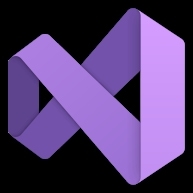
Visual Studio is an integrated development environment (IDE) from Microsoft. It is used to develop computer programs including websites, web apps, web services and mobile apps. Visual Studio uses Microsoft software development platforms such as Windows API, Windows Forms, Windows Presentation Foundation, Windows Store and Microsoft Silverlight. It can produce both native code and managed code.
Visual Studio includes a code editor supporting IntelliSense (the code completion component) as well as code refactoring. The integrated debugger works as both a source-level debugger and as a machine-level debugger. Other built-in tools include a code profiler, designer for building GUI applications, web designer, class designer, and database schema designer. It accepts plug-ins that expand the functionality at almost every level—including adding support for source control systems (like Subversion and Git) and adding new toolsets like editors and visual designers for domain-specific languages or toolsets for other aspects of the software development lifecycle (like the Azure DevOps client: Team Explorer).
Visual Studio supports 36 different programming languages and allows the code editor and debugger to support (to varying degrees) nearly any programming language, provided a language-specific service exists. Built-in languages include C, C++, C++/CLI, Visual Basic .NET, C#, F#, JavaScript, TypeScript, XML, XSLT, HTML, and CSS. Support for other languages such as Python, Ruby, Node.js, and M among others is available via plug-ins. Java (and J#) were supported in the past.
The most basic edition of Visual Studio, the Community edition, is available free of charge. The slogan for Visual Studio Community edition is “Free, fully-featured IDE for students, open-source and individual developers”.
As of January 10, 2023, Visual Studio 2022 is a current production-ready version. Visual Studio 2013, 2015 and 2017 are on Extended Support, while 2019 is on Mainstream Support.
Read More About Visual Studio / Source
IntelliJ IDEA
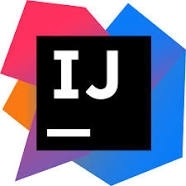
IntelliJ IDEA is an integrated development environment (IDE) written in Java for developing computer software written in Java, Kotlin, Groovy, and other JVM-based languages. It is developed by JetBrains (formerly known as IntelliJ) and is available as an Apache 2 Licensed community edition, and in a proprietary commercial edition. Both can be used for commercial development.
Read More About IntelliJ IDEA / Source
PyCharm
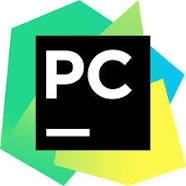
PyCharm is an integrated development environment (IDE) used for programming in Python. It provides code analysis, a graphical debugger, an integrated unit tester, integration with version control systems, and supports web development with Django. PyCharm is developed by the Czech company JetBrains.It is cross-platform, working on Microsoft Windows, macOS and Linux. PyCharm has a Professional Edition, released under a proprietary license and a Community Edition released under the Apache License. PyCharm Community Edition is less extensive than the Professional Edition.
Read More About PyCharm / Source
IDLE
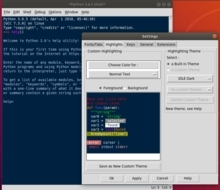
IDLE (short for Integrated Development and Learning Environment) is an integrated development environment for Python, which has been bundled with the default implementation of the language since 1.5.2b1. It is packaged as an optional part of the Python packaging with many Linux distributions. It is completely written in Python and the Tkinter GUI toolkit (wrapper functions for Tcl/Tk).
IDLE is intended to be a simple IDE and suitable for beginners, especially in an educational environment. To that end, it is cross-platform, and avoids feature clutter.
According to the included README, its main features are:
Multi-window text editor with syntax highlighting, autocompletion, smart indent and other.
Python shell with syntax highlighting.
Integrated debugger with stepping, persistent breakpoints, and call stack visibility.Author Guido van Rossum says IDLE stands for “Integrated Development and Learning Environment”, and since Van Rossum named the language Python after the British comedy group Monty Python, the name IDLE was probably also chosen partly to honor Eric Idle, one of Monty Python’s founding members.
Code::Blocks

Code::Blocks is a free, open-source cross-platform IDE that supports multiple compilers including GCC, Clang and Visual C++. It is developed in C++ using wxWidgets as the GUI toolkit. Using a plugin architecture, its capabilities and features are defined by the provided plugins.
Currently, Code::Blocks is oriented towards C, C++, and Fortran. It has a custom build system and optional Make support.
Code::Blocks is being developed for Windows and Linux and has been ported to FreeBSD, OpenBSD and Solaris. The latest binary provided for macOS version is 13.12 released on 2013/12/26 (compatible with Mac OS X 10.6 and later), but more recent versions can be compiled and MacPorts supplies version 17.12.
Read More About Code::Blocks / Source
Atom (Editor)

Atom is a deprecated free and open-source text and source code editor for macOS, Linux, and Windows with support for plug-ins written in JavaScript, and embedded Git Control. Developed by GitHub, Atom was released on June 25, 2015.Most of the extending packages have free software licenses and are community-built and maintained.On June 8, 2022, GitHub announced that Atom’s end-of-life would occur on December 15 of that year, “in order to prioritize technologies that enable the future of software development”, specifically its GitHub Codespaces and Microsoft’s Visual Studio Code.
Read More About Atom (Editor) / Source
RubyMine
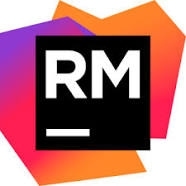
JetBrains s.r.o. (formerly IntelliJ Software s.r.o.) is a Czech software development private limited company which makes tools for software developers and project managers. The company has its headquarters in Prague, and has offices in China, Europe, and the United States.The company offers integrated development environments (IDEs) for a variety of programming languages. The company created the Kotlin programming language, which can run in a Java virtual machine (JVM), in 2011.
InfoWorld magazine awarded the firm “Technology of the Year Award” in 2011 and 2015.
Read More About RubyMine / Source
WebStorm
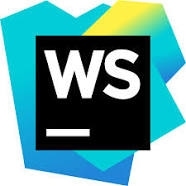
WebStorm, our IDE for JS and related technologies, makes the development experience more enjoyable by automating routine work and helping with complex
Read More About WebStorm / Source
Xcode
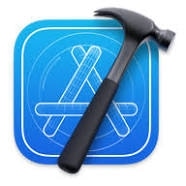
Xcode is Apple’s integrated development environment (IDE) for macOS, used to develop software for macOS, iOS, iPadOS, watchOS, and tvOS. It was initially released in late 2003; the latest stable release is version 14.2, released on December 13, 2022, via the Mac App Store with macOS Monterey. The software suite is offered free of charge. Registered developers can download preview releases and prior versions of the suite through the Apple Developer website. Xcode includes command-line tools which enable UNIX-style development via the Terminal app in macOS. They can also be downloaded and installed without the GUI.
Read More About Xcode / Source
Cloud9 IDE
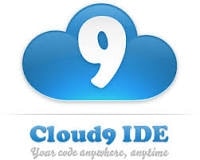
Cloud9 IDE is an Online IDE (integrated development environment), published as open source from version 2.0, until version 3.0. It supports multiple programming languages, including C, C++, PHP, Ruby, Perl, Python, JavaScript with Node.js, and Go.
It is written almost entirely in JavaScript, and uses Node.js on the back-end. The editor component uses Ace.
Cloud9 was acquired by Amazon in July 2016 and became a part of Amazon Web Services (AWS). New users may only use the Cloud9 service through an AWS account.From March 2018, existing accounts on Cloud9’s original website could be used, but new accounts could not be created. On April 2, 2019, Cloud9 announced that users would not be able to create new and use old workspaces on c9.io (aka original version, not Amazon Cloud9) after June 30, 2019.
Read More About Cloud9 IDE / Source
Zend Studio
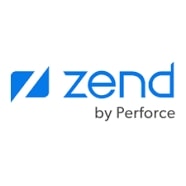
Zend Studio is a commercial, proprietary integrated development environment (IDE) for PHP developed by Zend Technologies, based on the PHP Development Tools (PDT) plugin for the Eclipse platform (the PDT project is led by Zend).
Zend Studio is tightly integrated with Zend Server, Zend’s pre-integrated, tested PHP application stack. The integration enables developers to quickly set up a complete PHP environment and speed up root cause analysis of problems detected in testing or in the production environment.
Zend Studio is also integrated with Laminas. For example, it provides an MVC view for easy code navigation and integration with Zend_Tool for automated code generation.Along with Zend Server, in 2013 Zend Studio had been deployed at more than 40,000 companies.
Read More About Zend Studio / Source
BlueJ
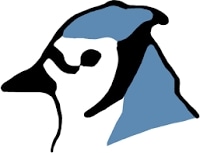
BlueJ is an integrated development environment (IDE) for the Java programming language, developed mainly for educational purposes, but also suitable for small-scale software development. It runs with the help of Java Development Kit (JDK).
BlueJ was developed to support the learning and teaching of object-oriented programming, and its design differs from other development environments as a result. The main screen graphically shows the class structure of an application under development (in a UML-like diagram), and objects can be interactively created and tested. This interaction facility, combined with a clean, simple user interface, allows easy experimentation with objects under development. Object-oriented concepts (classes, objects, communication through method calls) are represented visually and in its interaction design in the interface.
Read More About BlueJ / Source
CodeLite
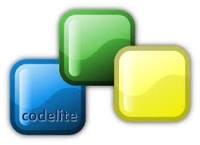
CodeLite is a free and open-source IDE for the C, C++, PHP, and JavaScript (Node.js) programming languages.
Read More About CodeLite / Source
Spyder
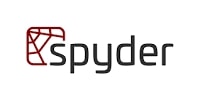
Spyder is an open-source cross-platform integrated development environment (IDE) for scientific programming in the Python language. Spyder integrates with a number of prominent packages in the scientific Python stack, including NumPy, SciPy, Matplotlib, pandas, IPython, SymPy and Cython, as well as other open-source software. It is released under the MIT license.Initially created and developed by Pierre Raybaut in 2009, since 2012 Spyder has been maintained and continuously improved by a team of scientific Python developers and the community.
Spyder is extensible with first-party and third-party plugins, includes support for interactive tools for data inspection and embeds Python-specific code quality assurance and introspection instruments, such as Pyflakes, Pylint and Rope. It is available cross-platform through Anaconda, on Windows, on macOS through MacPorts, and on major Linux distributions such as Arch Linux, Debian, Fedora, Gentoo Linux, openSUSE and Ubuntu.Spyder uses Qt for its GUI and is designed to use either of the PyQt or PySide Python bindings. QtPy, a thin abstraction layer developed by the Spyder project and later adopted by multiple other packages, provides the flexibility to use either backend.
Read More About Spyder / Source
MyEclipse
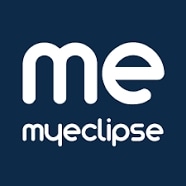
MyEclipse is a commercially available Java EE IDE created and maintained by the company Genuitec, a founding member of the Eclipse Foundation.
MyEclipse is built upon the Eclipse platform, and integrates both proprietary and open source code into the development environment.
MyEclipse has two primary versions (apart from the Blue Edition, Spring Edition, and Bling Edition referred to below): a Professional and a Standard edition. The Standard edition adds database tools, a visual web designer, persistence tools, Spring tools, Struts and JSF tooling, and a number of other features to the basic Eclipse Java Developer profile. It competes with the Web Tools Project, which is a part of Eclipse itself, but MyEclipse is a separate project entirely and offers a different feature set.
MyEclipse is available via two production-grade streams. The Continuous Integration (CI) stream includes the latest features and fixes, while the Stable stream has less frequent updates and includes only time-tested CI stream updates.
MyEclipse has also been made available via Secure Delivery Center, a technology that grew from its Pulse (ALM), brand, a provisioning tool that maintains Eclipse software profiles, including those that use MyEclipse. Additionally, MyEclipse is offering a customized version for IBM products, “MyEclipse Blue Edition”, that adds specific support for Rational Software and WebSphere development. Currently, MyEclipse Blue Edition is available for Windows and Linux, though Mac is unsupported.
In July 2011, Genuitec released MyEclipse “Bling,” which combines the MyEclipse Blue Edition and MyEclipse for Spring product lines into a unified offering.In January 2015, Genuitec launched the MyEclipse China site (www.myeclipsecn.com) to provide genuine MyEclipse software to large user base in China.
Read More About MyEclipse / Source
Android Studio

Android Studio is the official integrated development environment (IDE) for Google’s Android operating system, built on JetBrains’ IntelliJ IDEA software and designed specifically for Android development. It is available for download on Windows, macOS and Linux based operating systems. It is a replacement for the Eclipse Android Development Tools (E-ADT) as the primary IDE for native Android application development.
Android Studio was announced on May 16, 2013, at the Google I/O conference. It was in early access preview stage starting from version 0.1 in May 2013, then entered beta stage starting from version 0.8 which was released in June 2014. The first stable build was released in December 2014, starting from version 1.0. At the end of 2015, Google dropped support for Eclipse ADT, making Android Studio the only officially supported IDE for Android development.On May 7, 2019, Kotlin replaced Java as Google’s preferred language for Android app development. Java is still supported, as is C++.
Read More About Android Studio / Source
Komodo Edit
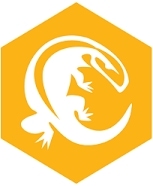
Komodo Edit is a free and open source text editor for dynamic programming languages. It was introduced in January 2007 to complement ActiveState’s commercial Komodo IDE. As of version 4.3, Komodo Edit is built atop the Open Komodo project. Komodo IDE is no longer supported and maintained by developers for Python.
Read More About Komodo Edit / Source
JDeveloper
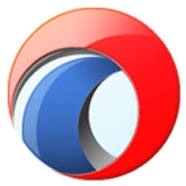
JDeveloper is a freeware IDE supplied by Oracle Corporation. It offers features for development in Java, XML, SQL and PL/SQL, HTML, JavaScript, BPEL and PHP. JDeveloper covers the full development lifecycle from design through coding, debugging, optimization and profiling to deploying.
With JDeveloper, Oracle has aimed to simplify application development by focusing on providing a visual and declarative approach to application development in addition to building an advanced coding-environment. Oracle JDeveloper integrates with the Oracle Application Development Framework (Oracle ADF) – an end-to-end Java EE-based framework that further simplifies application development.
The core IDE exposes an API that other teams in Oracle use to build extensions to JDeveloper. BPEL, Portal, Business Intelligence and other components of the Oracle platform all build their design-time tools on top of JDeveloper. To accommodate to Sun Microsystems (and thus NetBeans) acquisition versions released after 2012 are sharing significant code with NetBeans platform. The same IDE platform also serves as the basis of another Oracle product, SQL Developer, which Oracle Corporation promotes specifically to PL/SQL and database developers.
Read More About JDeveloper / Source
Qt Creator
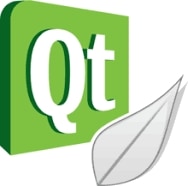
Qt Creator is a cross-platform C++, JavaScript and QML integrated development environment (IDE) which simplifies GUI application development. It is part of the SDK for the Qt GUI application development framework and uses the Qt API, which encapsulates host OS GUI function calls. It includes a visual debugger and an integrated WYSIWYG GUI layout and forms designer. The editor has features such as syntax highlighting and autocompletion. Qt Creator uses the C++ compiler from the GNU Compiler Collection on Linux. On Windows it can use MinGW or MSVC with the default install and can also use Microsoft Console Debugger when compiled from source code. Clang is also supported.
Read More About Qt Creator / Source
JCreator

JCreator is a Java IDE created by Xinox Software. Its interface is similar to that of Microsoft’s Visual Studio. Because it is programmed entirely in C++, (except the first version (0.1), which was Java-based ), Xinox Software has asserted that JCreator is faster than competing Java-based Java IDEs.
JCreator has three editions:
Lite Edition (LE): shareware that costs $35 after a 30-day trial.
Pro Edition (Pro): shareware that costs $79 after a 30-day trial.
Lite-Pro Edition (LE-PRO).JCreator is only available on the Windows operating system. However, both the LE and Pro versions of JCreator run adequately on Linux (using Wine). So far no Linux versions are planned for immediate release, but new components will be built for cross-compatibility in mind.The feature set of the Pro version is comparable to that of other language aware IDEs with respect to project management and editing features, but lacks advanced features, such as automated refactoring, support for common frameworks etc., which can be found in the dominant Java IDEs such as Eclipse and IntelliJ IDEA. The free LE version further lacks some features, such as code completion, that are included with other free IDEs. Unlike the dominant Java IDEs today, JCreator also lacks the level of extensibility through third-party plugins that is common in popular Java IDEs.
Read More About JCreator / Source
KDevelop
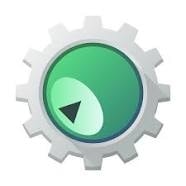
KDevelop is a free and open-source integrated development environment (IDE) for Unix-like computer operating systems and Windows. It provides editing, navigation and debugging features for several programming languages, and integration with build automation and version-control systems, using a plugin-based architecture.KDevelop 5 has parser backends for C, C++, Objective-C, OpenCL and JavaScript/QML, with plugins supporting PHP, Python 3 and Ruby. Basic syntax highlighting and code folding are available for dozens of other source-code and markup formats, but without semantic analysis.
KDevelop is part of the KDE project, and is based on KDE Frameworks and Qt. The C/C++ backend uses Clang to provide accurate information even for very complex codebases.
Read More About KDevelop / Source
MonoDevelop

MonoDevelop (also known as Xamarin Studio) is an open-source integrated development environment for Linux, macOS, and Windows. Its primary focus is development of projects that use Mono and .NET Framework. MonoDevelop integrates features similar to those of NetBeans and Microsoft Visual Studio, such as automatic code completion, source control, a graphical user interface (GUI) and Web designer. MonoDevelop integrates a Gtk# GUI designer called Stetic. It supports
Boo,
C,
C++,
C#,
CIL,
D,
F#,
Java,
Oxygene,
Vala, JavaScript, TypeScript
and Visual Basic.NET.MonoDevelop can be used on Windows, macOS and Linux. Officially supported Linux distributions include CentOS, Debian, Fedora, openSUSE, SUSE Linux Enterprise, Red Hat Enterprise Linux and Ubuntu, with many other distributions providing their own unofficial builds of MonoDevelop in their repositories. macOS and Windows have been officially supported since version 2.2.MonoDevelop has included a C# compiler (an alternative to MSBuild and CSC) since its earliest versions. It currently includes a compiler that supports C# 1.0, C# 2.0, C# 3.0, C# 4.0, C# 5.0 and C# 6.0.A customized version of MonoDevelop formerly shipped with Windows and Mac versions of Unity, the game engine by Unity Technologies. It enabled advanced C# scripting, which was used to compile cross-platform video games by the Unity compiler. It has since been replaced by Visual Studio Community, except on Linux versions.
Read More About MonoDevelop / Source
Arduino IDE
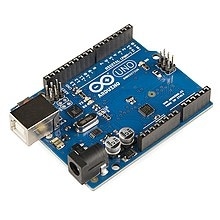
Arduino is an open-source hardware and software company, project, and user community that designs and manufactures single-board microcontrollers and microcontroller kits for building digital devices. Its hardware products are licensed under a CC BY-SA license, while the software is licensed under the GNU Lesser General Public License (LGPL) or the GNU General Public License (GPL), permitting the manufacture of Arduino boards and software distribution by anyone. Arduino boards are available commercially from the official website or through authorized distributors.Arduino board designs use a variety of microprocessors and controllers. The boards are equipped with sets of digital and analog input/output (I/O) pins that may be interfaced to various expansion boards (‘shields’) or breadboards (for prototyping) and other circuits. The boards feature serial communications interfaces, including Universal Serial Bus (USB) on some models, which are also used for loading programs. The microcontrollers can be programmed using the C and C++ programming languages, using a standard API which is also known as the Arduino Programming Language, inspired by the Processing language and used with a modified version of the Processing IDE. In addition to using traditional compiler toolchains, the Arduino project provides an integrated development environment (IDE) and a command line tool developed in Go.
The Arduino project began in 2005 as a tool for students at the Interaction Design Institute Ivrea, Italy, aiming to provide a low-cost and easy way for novices and professionals to create devices that interact with their environment using sensors and actuators. Common examples of such devices intended for beginner hobbyists include simple robots, thermostats, and motion detectors.
The name Arduino comes from a bar in Ivrea, Italy, where some of the project’s founders used to meet. The bar was named after Arduin of Ivrea, who was the margrave of the March of Ivrea and King of Italy from 1002 to 1014.
Read More About Arduino IDE / Source
DrJava

DrJava is a lightweight IDE for the Java programming language. Designed primarily for beginners and actively developed and maintained by the JavaPLT group at Rice University, its interface uses Sun Microsystems’ Swing toolkit and therefore has a consistent appearance on different platforms. DrJava has the ability to interactively evaluate Java code from a console and to present output as well to the same console. It has many other features that have been designed for advanced users as well. DrJava offers a JUnit test facility.
There have been 4,332,375 downloads as of May 1, 2021.
Read More About DrJava / Source
GNAT Programming Studio
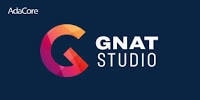
GNAT Programming Studio (GPS, formerly known as the GNAT Programming System) is a free multi-language integrated development environment (IDE) by AdaCore. GPS uses compilers from the GNU Compiler Collection, taking its name from GNAT, the GNU compiler for the Ada programming language.
GPS is cross-platform, running on Linux, FreeBSD, Microsoft Windows, macOS, and Solaris. GPS uses GTK+ as the widget toolkit for its graphical user interface. Released under the GNU General Public License, GPS is free software.
Read More About GNAT Programming Studio / Source
Anjuta

Anjuta is an integrated development environment written for the GNOME project. It has support for C, C++, Java, JavaScript, Python and Vala programming language.
Read More About Anjuta / Source
Eclipse Che

Eclipse Che is an open-source, Java-based developer workspace server and Online IDE (integrated development environment). It includes a multi-user remote development platform. The workspace server comes with a flexible RESTful webservice. It also contains a SDK for creating plug-ins for languages, frameworks or tools. Eclipse Che is an Eclipse Cloud Development (ECD) top-level project, allowing contributions from the user community.
Read More About Eclipse Che / Source
Adobe Dreamweaver

Adobe Dreamweaver is a proprietary web development tool from Adobe Inc. It was created by Macromedia in 1997 and developed by them until Macromedia was acquired by Adobe Systems in 2005.Adobe Dreamweaver is available for the macOS and Windows operating systems.
Following Adobe’s acquisition of the Macromedia product suite, releases of Dreamweaver subsequent to version 8.0 have been more compliant with W3C standards. Recent versions have improved support for Web technologies such as CSS, JavaScript, and various server-side scripting languages and frameworks including ASP (ASP JavaScript, ASP VBScript, ASP.NET C#, ASP.NET VB), ColdFusion, Scriptlet, and PHP.
Read More About Adobe Dreamweaver / Source
Codelobster

Codelobster is a portable integrated development environment (IDE) primarily for PHP, which also supports HTML, CSS, and JavaScript development. Plug-ins are available for Drupal, WordPress, Smarty, Joomla, JQuery, Facebook, Codeigniter, Yii, and CakePHP. Free registration by email is required after 30 days of use of the program, and there are paid versions also (“Lite” and “Professional”) for additional features. The program is missing a help system as of its latest version.The program features syntax highlighting and auto-completion for SQL, PHP, HTML, CSS, JavaScript, and XML, as well as automatic syntax checking. There is an HTML and CSS inspector like Firebug. It also includes Drupal support. All plugins are paid, but they offer trial periods of varying length.
Read More About Codelobster / Source
Nodeclipse
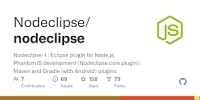
Nodeclipse is a set of third-party developer solutions for Eclipse for programming in JavaScript, CoffeeScript with focus on Node.js.
Nodeclipse also refers to the team that makes this software as free open-source on GitHub.Nodeclipse Eclipse plug-in (Nodeclipse-1 on GitHub) is core that other solutions are based on. It is available via update site or Eclipse Marketplace. Other solutions are “Eclipse Node.js IDE” (Enide), set of plugins and “Node Tool Suite” (NTS), an integrated development environment (IDE).
Read More About Nodeclipse / Source
jGRASP

jGRASP is a development environment that includes the automatic creation of software visualizations. It produces static visualizations of source code structure and visualizations of data structures at runtime.The runtime data structure visualizations are also available as plugins for IntelliJ IDEA, Android Studio, and Eclipse.
jGRASP is implemented in Java, and runs on all platforms with a Java Virtual Machine (Java version 1.8 or higher). GRASP (Linux, UNIX) and pcGRASP (Windows) are written in C/C++, whereas jGRASP is written in Java (the “j” in jGRASP means it runs on the JVM). The jGRASP web site offers downloads for Windows, Mac OS, and as a generic ZIP file suitable for Linux and other systems.
For languages other than Java, jGRASP is a source code editor. It can be configured to work with most free and commercial compilers for any programming language.
Read More About jGRASP / Source
SharpDevelop
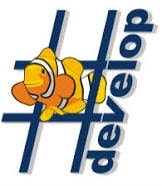
SharpDevelop (also styled as #develop) is a discontinued free and open source integrated development environment (IDE) for the .NET Framework, Mono, Gtk# and Glade# platforms. It supports development in C#, Visual Basic .NET, Boo, F#, IronPython and IronRuby programming languages.
Read More About SharpDevelop / Source
Dev-C++

Dev-C++ is a free full-featured integrated development environment (IDE) distributed under the GNU General Public License for programming in C and C++. It was originally developed by Colin Laplace and first released in 1998. It is written in Delphi.
It is bundled with, and uses, the MinGW or TDM-GCC 64bit port of the GCC as its compiler. Dev-C++ can also be used in combination with Cygwin or any other GCC-based compiler.
Read More About Dev-C++ / Source
PyScripter
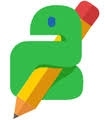
PyScripter is a free and open-source Python integrated development environment (IDE) for Windows. It is built with Delphi’s Object Pascal and Python.
It originally started as a lightweight IDE designed to serve the purpose of providing a strong scripting solution for Delphi applications. Over time, it evolved into a full-featured stand-alone Python IDE. It is built in Delphi using Python4Delphi (P4D) and is extensible using Python scripts. Being built in a compiled language make it rather lightweight compared to some of the other IDEs. Currently, it is only available for Windows.
Read More About PyScripter / Source
Greenfoot

Greenfoot is an integrated development environment using Java or Stride designed primarily for educational purposes at the high school and undergraduate level. It allows easy development of two-dimensional graphical applications, such as simulations and interactive games.
Greenfoot is being developed and maintained at King’s College London, with support from Oracle. It is free software, released under the GPL license. Greenfoot is available for Windows, macOS, Linux, Solaris, and any recent JVM.
Read More About Greenfoot / Source
PHP Development Tools
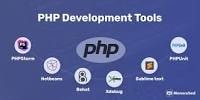
PHP Development Tools (PDT) is a language IDE plugin for the Eclipse platform and the open-source project that develops it.
The project intends to encompass all tools necessary to develop PHP based software. It uses the existing Eclipse Web Tools Project to provide developers with PHP capabilities. All these PHP tools are easy to use and developers can speed up the development process by using these tools. Additional plugins are available as PDT Extensions.
Read More About PHP Development Tools / Source
Light Table

Light Table is an integrated development environment for software engineering developed by Chris Granger and Robert Attorri. It features real-time feedback allowing instant execution, debugging and access to documentation. The instant feedback provides an execution environment intended to help developing abstractions.The development team attempted to create a program which shows the programmer what the effects of their additions are in real-time, rather than requiring them to work out the effects as they write the code. Though the program began by supporting only Clojure, it has since aimed to support Python and JavaScript. The developers claim that the software can reduce programming time by up to 20%.It was financed by a Kickstarter fundraising campaign and subsequently backed by Y Combinator. The Kickstarter campaign aimed to raise $200,000 USD and finished with $316,720 USD.
Read More About Light Table / Source
Adobe Flash Builder

Adobe Flash Builder (previously known as Adobe Flex Builder) is an integrated development environment (IDE) built on the Eclipse platform that speeds development of rich Internet applications (RIAs) and cross-platform desktop applications, particularly for the Adobe AIR platform. Adobe Flash Builder 4 is available in two editions: Standard and Premium.
Adobe Flash Builder offers built-in code editors for MXML and ActionScript and a WYSIWYG editor for modifying MXML applications. Adobe Flash Builder includes an interactive debugger, allowing developers to step through code execution while inspecting variables and watching expressions. Flex Builder 3 added support for performance analysis. The profiling view displays statistical information about memory use in addition to function call execution time.
Prior to version 4, this product was known as Flex Builder. The name change is meant to signify its connection to other products in the Adobe Flash Platform and to create a clear distinction between the open source free Flex SDK and the IDE.
Read More About Adobe Flash Builder / Source
Rational Application Developer
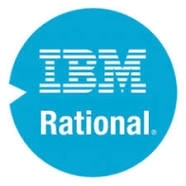
It provides tools for visually designing, constructing, testing, analyzing and deploying many types of applications including Java, Java EE
Read More About Rational Application Developer / Source
SASM
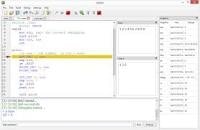
SASM (short for SimpleASM) is a free and open source cross-platform integrated development environment for the NASM, MASM, GAS and FASM assembly languages. It features syntax highlighting and includes a debugger.SASM is intended to allow users to easily develop and run programs written in assembly language. It was written by Dmitriy “Dman95” Manushin and licensed under the GNU GPL v3.0. It is written in C++ and uses the multi-platform Qt toolkit.
Python Tools for Visual Studio
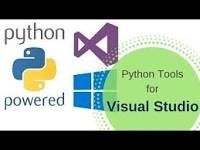
Python Tools for Visual Studio (PTVS) is a free and open-source plug-in for versions of Visual Studio up to VS 2015 providing support for programming in Python. Since VS 2017, it is integrated in VS and called Python Support in Visual Studio. It supports IntelliSense, debugging, profiling, MPI cluster debugging, mixed C++/Python debugging, and more. It is released under the Apache License 2.0, and is developed primarily by Microsoft.
The first version was on March 8, 2011. The latest version for VS 2015 is 2.2.6.
Read More About Python Tools for Visual Studio / Source
RadPHP
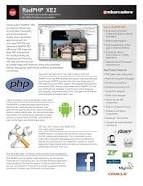
RadPHP (formerly Delphi for PHP) was an IDE and rapid application development framework for the PHP programming language developed by Embarcadero Technologies.
The VCL includes many components that can be used dynamically with each other.
It is well integrated with MySQL database as well as Ajax. It is a method for developing Web, Facebook and mobile applications.The Window component can be used in conjunction with other components to create an interface that is very similar to the Microsoft Windows interface inside a JavaScript compatible web-browser.
Read More About RadPHP / Source
Dev-Pascal
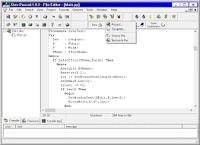
Dev-Pascal is a free integrated development environment (IDE) distributed under the GNU General Public License for programming in Pascal and Object Pascal. It supports an ancient version of the Free Pascal compiler and GNU Pascal as backends. The IDE is written in Delphi. It can also handle the Insight Debugger. Dev-Pascal runs on Microsoft Windows.
Read More About Dev-Pascal / Source
R Tools for Visual Studio
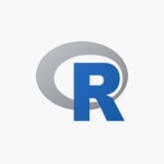
R Tools for Visual Studio (RTVS) is a plug-in for the Microsoft Visual Studio integrated development environment (IDE), used to provide support for programming in the language R. It supports IntelliSense, debugging, plotting, remote execution, SQL integration, and more. It is distributed as free and open-source software under the Apache License 2.0, and is developed mainly by Microsoft.The first version released was 0.3 on March 5, 2016, and the current (version 1.0) was released in 2017. However, the project is described as “not actively supported” since February 2019.
Read More About R Tools for Visual Studio / Source
MSEide+MSEgui

MSEide is a Rapid Application Development IDE for platform independent rich GUI applications in the Pascal language.
Read More About MSEide+MSEgui / Source





